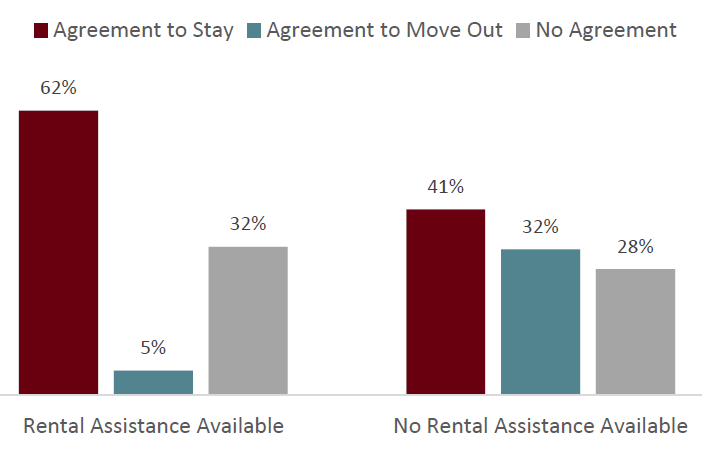| Refresh | This website mediate.com/rsi-report-examines-n-h-eviction-mediation-program-agreement-numbers-hold-but-more-tenants-move-out-after-rental-support-ends/ is currently offline. Cloudflare's Always Online™ shows a snapshot of this web page from the Internet Archive's Wayback Machine. To check for the live version, click Refresh. |
RSI recently completed an evaluation of New Hampshire’s statewide Eviction Diversion program. Begun in 2021, this voluntary program provides landlords and residential tenants the opportunity to mediate before a landlord/tenant eviction case is filed. We were asked to evaluate program use, mediation agreement rates, and the time from initial contact to case closure. The evaluation period ran from October 1, 2022, through August 31, 2023. We found overall that the program was successful at reaching landlords and tenants around the state, as well as at helping tenants and landlords to avoid eviction. The program was efficient as well.

The program process almost always begins when a tenant calls the court’s central phone line, although sometimes the landlord initiates contact and sometimes parties email the program directly. If the party calls the court’s central phone line, a staff member collects a summary of the party’s needs and emails the information, along with the person’s contact information, to the case manager/mediator. The case manager/mediator then contacts the landlords and tenants, conducts intakes, and schedules and conducts mediation. She also provides other assistance, such as a list of resources and referral to legal services.
During the evaluation period, 775 tenants or landlords reached out to the court about the eviction mediation program. Some reached out more than once, leading to 800 individual inquiries, 90% of which were from tenants. Of the 800 cases in which an inquiry with the Eviction Diversion Program was made, 176 (22%) were mediated.
We had final outcomes for 175 of the 176 mediations. Of these 175 mediations, 125 (71%) ended in an agreement and 50 (29%) ended without an agreement. The parties were more likely to agree to the tenant remaining in the rental than they were to agree to the tenant moving out: 63% of agreements were for the tenant to stay, while 37% were for the tenant to move out.

Housing agencies stopped accepting rental assistance applications at the end of October 2022 and stopped processing applications at the end of 2022. Somewhat surprisingly, this did not lead to a drop in agreements. The percentage of mediations ending in agreement rose from 68% before rental assistance ended (25 of 37 mediations) to 72% (100 of 138 mediations) afterward. However, the end of rental assistance did lead to a smaller proportion of agreements allowing tenants to stay. In October and November, 21 of 23 (91%) agreements were for the tenant to stay. This dropped to 4 of 9 (44%) in December, and 52 of 91 (57%) for the first eight months of 2023. Overall, 56% of mediation agreements after the end of rental assistance allowed the tenant to stay.
Tenants were offered the option to mediate by phone or by video. They overwhelmingly chose to mediate by phone: 157 of the 162 mediations for which we had data were conducted by phone. Only five tenants selected video mediation.
Mediations in general were conducted within a month of the tenant or landlord’s initial contact with the program. Almost two-thirds were closed within two weeks and only 11% took more than 28 days to close.
Based on our findings, we recommended that the program continue. It is well used and effective in helping tenants and landlords reach agreement. It has also been efficient, mediating cases quickly. We also recommended the court continue to give tenants the option to mediate by phone or video. This increases self-determination, and each method offers benefits. Phone mediation, for example, reduces the risk of a power imbalance caused by one party having a better grasp of technology or access to better technology, while video mediation offers the opportunity to exchange and view documents.
When divorce and child custody cases go to trial, they're usually bench trials, i.e., a judge makes the decision. But in some states, a parent can request a jury trial...
By Ben ColtrinA few weeks ago, we published Parts one to three and four to six of The Mediator's Log. Here are Parts seven to nine, describing how the mediator's day progresses...
By John SturrockForget about cross-cultural mediation - that's chickenfeed. Shoot... what I want to do is mediate with the damn chicken - because cross-species mediation is where it's at. (So, why? -...
By Geoff Sharp